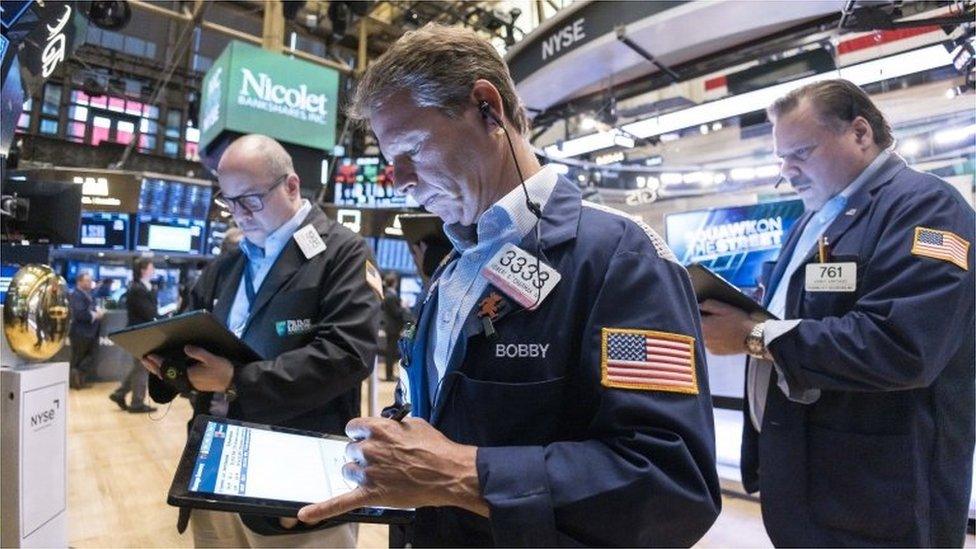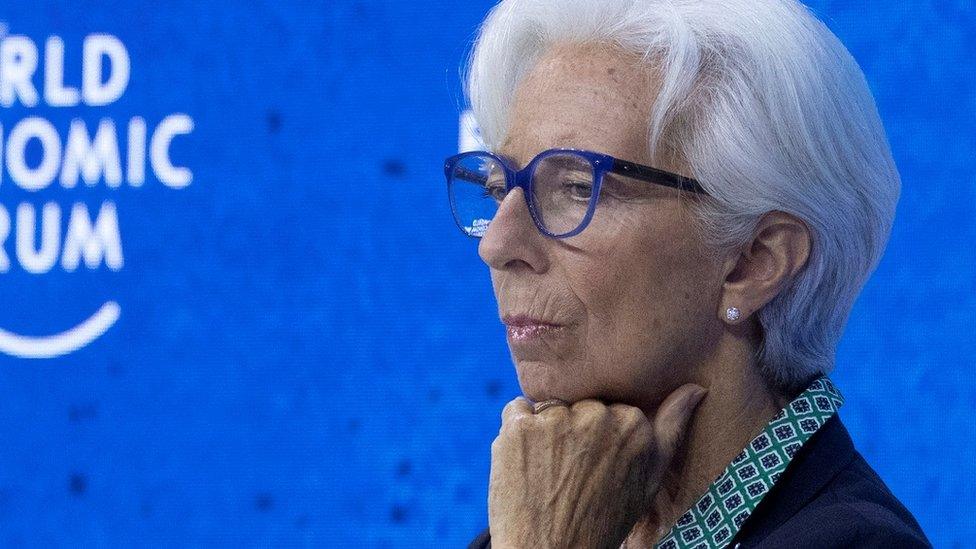Stocks slide over global economy concerns
- Published

Global stock markets have tumbled amid fears that rising consumer prices will prove harder to control than expected and could cause an economic downturn.
Investors sold off shares in Asia, Europe and the US, sending key exchanges down 2% or more.
In the US, America's S&P 500 share index fell 3.8%, pushing it more than 20% below its most recent high.
That milestone is known as a bear market and seen as a warning of an economic slowdown.
At a conference on Monday, the boss of investment bank Morgan Stanley, James Gorman, said the odds that the US would fall into recession were around 50%, though he added that he did not expect the contraction to last for long.
The warnings come after the US on Friday reported higher inflation than expected in May, with the annual rate rising to 8.6%, a more than 40-year high.
The figures confounded hopes that price pressures were easing, and put investors on alert that the US central bank, which has been raising rates to try to curb inflation, will need to move even more aggressively.
The Federal Reserve is due to announce its next rate decision on Wednesday.
Investors are also anticipating further rate rises from central banks in other countries grappling with high inflation, including the Bank of England.
Analysts have warned the current economic conditions could trigger a global downturn, as rate rises work to curb inflation by cooling demand, but slow economic growth.
America's Dow Jones share index, which declined on Friday, fell again on Monday, closing down more than 2.7%.
The S&P 500, which tracks the biggest US companies, plunged more than 3.8% and the tech-heavy Nasdaq lost more than 4.6%.
The falls affected nearly all sectors, hitting big names such as plane-maker Boeing, energy giant Chevron and software firm Salesforce.
Meanwhile in Europe, Germany's Dax fell roughly 2.4% and France's CAC 40 index closed down nearly 2.7%. The UK's FTSE 100 ended 1.5% lower.
Earlier, Japan's benchmark Nikkei index ended the day down by just over 3%. In Hong Kong, the Hang Seng closed 3.4% lower, while the Kospi in South Korea finished down 3.3%.
Dollar gains
The US dollar, which is traditionally seen as a safe asset in risky times and usually benefits from higher interest rates, has risen, putting currencies in other countries under pressure.
The Indian rupee has fallen to a new record low, dropping below 78 to the US dollar, while the US dollar strengthened to 135 Japanese yen for the first time in over two decades.
Sterling fell to its lowest level against the dollar in two years on Monday, after the UK reported the economy contracted in April.
Meanwhile,the cryptocurrency Bitcoin fell below $24,000 to its lowest level since December 2020.
Analysts have warned that a global economic slowdown is likely as the increasing cost of living prompts households to cut back spending.
A warning about rising Covid-19 infections in Beijing added to growth concerns.
Beijing's most populous district, Chaoyang, announced on Sunday that three rounds of mass testing would be carried out to control a "ferocious" outbreak - 166 confirmed cases so far - that emerged at a bar in a nightlife and shopping area last week.
This has sparked fears of more lockdowns, which threaten to slow the city's economic recovery and impact global supply chains, just a short time after restrictions were eased.
Ros Atkins explains why UK households are being hit by rising prices.
Related topics
- Published10 June 2022

- Published9 June 2022

